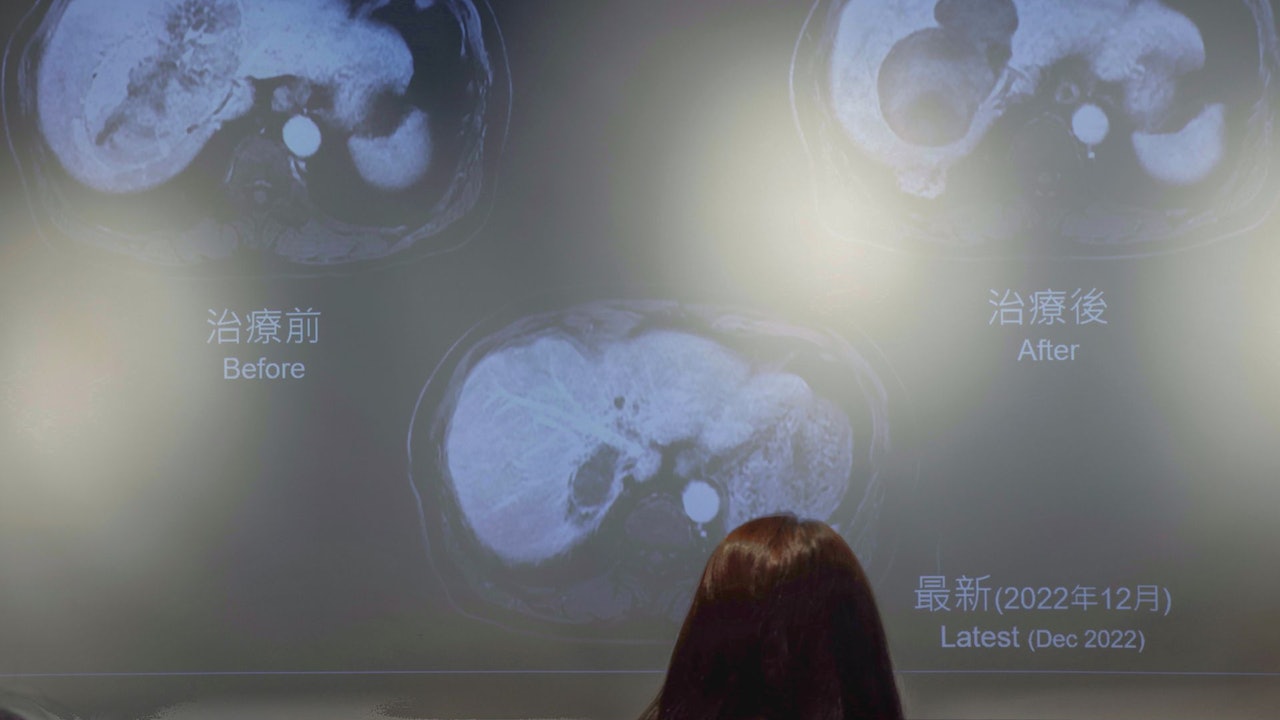The Faculty of Medicine of the University of Hong Kong pioneered the world's first trilogy treatment plan for medium-term liver cancer, "shrink first and remove later". Research shows that more than 50% of patients can undergo surgery to remove the tumor after a course of treatment, and the survival rate within two years is as high as 90%.
Jiang Ziliang, clinical assistant professor of clinical oncology department of the University of Hong Kong, Chen Zhiren, clinical professor of surgery of the University of Hong Kong, and Mr. Wen Yingqiang, a liver cancer survivor.
(From left to right) (Photo by Yu Junliang)
40% of the patients recovered without surgery and the survival rate reached 90%
The Faculty of Medicine of the University of Hong Kong pioneered the world's first three-step treatment plan for medium-term liver cancer "shrink first and then remove". A total of 33 liver cancer patients participated in the study. The tumor diameters of the patients ranged from 5 to 17.5 cm.
The results of the study showed that about 55% of the patients were suitable for surgery to remove the tumor after a course of treatment, 4 of them (12%) underwent radical surgery, and 14 (42%) of the patients had all tumor cells necrosis, and only needed regular observation in the later period, two years The survival rate in China can be as high as more than 90%, and the median is 30 months.
The three-step system of treatment can show results in 6 months
In the first part of the treatment, the patient will receive transcatheter arterial chemoembolization (TACE) to control the tumor and stain the tumor with lipiodol; on the 28th day, 5 sessions of stereotactic radiation therapy (SBRT) will be performed to kill cancer cells and activate Immune system: Immunotherapy (IO) every two weeks after 14 days to stimulate the immune system and identify the tumor location.
One of the patients involved in the study was 68-year-old Wen Yingqiang. He had a tumor in the central and mesial hepatic vein of his liver. When receiving immunotherapy, after two injections of immune injections, the tumor was completely necrotic. His thigh moved uncontrollably for a short time, but fortunately returned to normal.
The patient who participated in the study, Wen Yingqiang, said that after he was injected with the immunization shot, his thigh moved uncontrollably for a short time.
(Photo by Yu Junliang)
The patient Wen Yingqiang who participated in the study underwent the trilogy of treatment, and the MRI showed that the tumor was completely necrotic.
(Photo by Yu Junliang)
Dr. Jiang Ziliang, Department of Clinical Oncology, Faculty of Medicine, Faculty of Medicine, HKU pointed out that uncontrolled body reactions of patients after receiving treatment are rare phenomena, while common side effects of immunotherapy include dermatitis, pneumonia, hepatitis and other inflammations, and steroids can be prescribed for treatment.
The comprehensive treatment plan of "shrink first and remove later" is available for immediate clinical application, and Queen Mary Hospital also provides this treatment plan.
However, immunotherapy is a self-financed item of the patient, which costs 30,000 to 40,000 yuan a month. Studies have shown that most patients have achieved results after 6 months of treatment and do not need to do it again. That is, the full-term treatment costs about 200,000 yuan.
Patients who are suitable for the relevant treatment plan must have a tumor volume of not less than 5 cm, and the number of tumors should be less than 4. The tumor should not invade the main blood vessels and cannot be cured by surgery. The cells have not spread to other organs.
The HKU research team intends to expand the project to patients with mid-stage liver cancer and poor liver function, so as to improve their chances of receiving liver transplantation, and implement dual immunotherapy, that is, on the basis of the immune system recognizing tumors, it further stimulates the immune system to produce more targeted tumors. Tumor white blood cells.
HKU Faculty of Medicine develops a new treatment method for liver cancer, knocking out the gene EHD2 effectively inhibits the growth of liver cancer cells and immune combination therapy reduces the risk of progression and death in advanced liver cancer. The median survival time of patients is two years. Informed her daughter, who is only five months old and 37 years old with liver cancer, came to Hong Kong from the UK to send Princess Margaret to the isolation ward as a close contact without a confirmed diagnosis.





